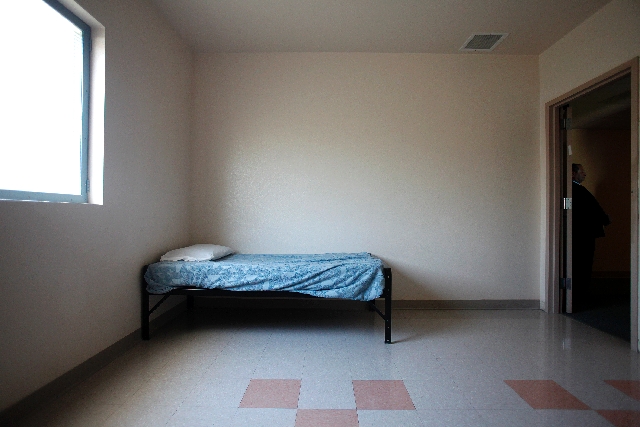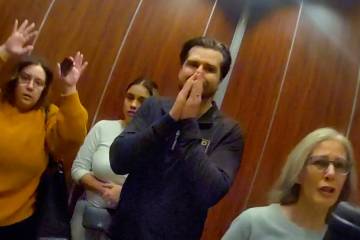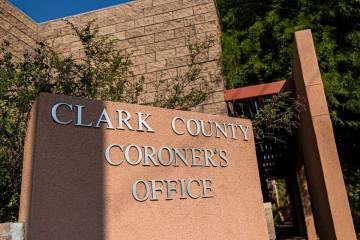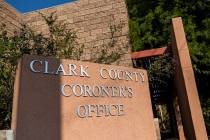Private hospital to expand services for mentally ill youth
A private psychiatric hospital in Las Vegas is stepping up to help mentally ill youth with a “very overdue” expansion to services.
Montevista Hospital, a 90-bed facility, will invest more than $10 million in improvements that will include 72 additional beds, with 48 devoted to residential youth ages 12-17, said Mike Garone, director of marketing. The hospital will break ground on the more than 50,000-square-foot facility at the end of the month.
Desert Willow Treatment Center, with 58 beds, is the only public hospital currently offering residential treatment for youth in Clark County. But many experts say the facility is not enough to meet the demand for those services.
As a result, many local youths are sent out of state for residential treatment, officials said.
“We desperately needed this (expansion) for years,” Family Court Judge William Voy said. “I didn’t think I would even see it happen.”
The Clark County Department of Juvenile Justice Services sends about 160 young people in need of residential mental health care out of state each year, Voy said. Their average age is 15.
As of Wednesday, the Clark County Department of Family Services, which oversees children removed from their homes because of neglect or abuse, had eight children receiving out-of-state treatment, said Kristi Jourdan, Family Services spokeswoman.
Kelly Wooldridge, deputy administrator for the state’s Division of Child and Family Services, said Desert Willow has a 12-bed acute unit for youths who are suicidal or homicidal. It has 24 beds for residential treatment for those ages 12-18 and a 14-bed unit for youths who are sex offenders with emotional and behavioral issues.
An eight-bed unit has been closed for two years for various reasons, but most recently because of the local nursing shortage, Wooldridge said.
There’s usually a wait list for the residential treatment unit, she said. Those who need services sometimes have to wait 10 to 30 days.
Montevista Hospital, Seven Hills Behavioral Institute in Henderson, nonprofits and private organizations had approached Voy about the needs of mentally ill youth. Montevista is the first entity to step up and address something that’s “very overdue,” he said.
“Once you break ground, you are pretty much committed,” Voy said.
Montevista, which also treats chemical dependency, has been in the community for 27 years.
It was bought by Strategic Behavioral Health in Memphis, Tenn., on Jan. 1, 2012, Garone said. Strategic Behavioral Health also bought Red Rock Behavioral Health Hospital.
The parent company conducted a community needs assessment that indicated a large number of young people were being sent out of state for residential treatment because of the lack of local resources, he said.
“We strongly believe that this community deserves to bring our kids home, allowing work to be done in person, directly with the family, and allowing for a stronger emphasis on continuity of care among providers,” Garone said.
Hospital officials will break ground on the new facility at 10 a.m. on May 30.
The expansion is expected to create 250 jobs, including therapists, licensed clinical workers, nurses and administrative staff, Garone said. The 48 beds for juveniles who need psychiatric residential care will be broken down into four 12-bed units.
Each unit will have a specialty, but no final decision has been made on what those will be, Garone said. Specialties being looked at include conduct disorders, developmental delays, mental health and substance abuse.
The benefits of the expansion can’t be quantified, Voy said.
The Family Court judge often finds himself with limited options for youths in his court. They either “sit in detention untreated” or are sent “somewhere where they can be treated.” He often sends young people to facilities in Utah, Arizona, Texas or Tennessee.
Many of them are juveniles who sexually act out but have other contributing factors for their actions, such as developmental issues or conduct issues, Voy said. They usually pose a danger to themselves or the community.
“They need to be in a controlled setting,” he said.
About 70 percent of the youths who come through the county’s Department of Juvenile Justice Services have mental health issues, Voy said. They either had never been diagnosed or had never received treatment.
Dr. Dale Carrison, University Medical Center’s chief of staff and head of emergency services, said mental health services for youths in Nevada make the state’s insufficient adult mental health services “look good.”
There are always young people, mostly teenagers, waiting at UMC to receive mental health services, he said: “I don’t know of a time when it’s been zero.”
Dr. Jay Fisher, medical director of pediatric emergency services at UMC, said that over the past month, about 20 percent of the inpatient beds have been occupied by children and teens waiting for mental health services.
The hospital always has had high numbers of mentally ill patients, but it has become more severe recently, Fisher said. That’s partly a result of increased awareness and improved screenings, he said, but the resources in the community don’t match the need.
Montevista’s additional services “will make a huge difference in our community,” Wooldridge said.
Contact Yesenia Amaro at yamaro@reviewjournal.com or 702-383-0440.





























